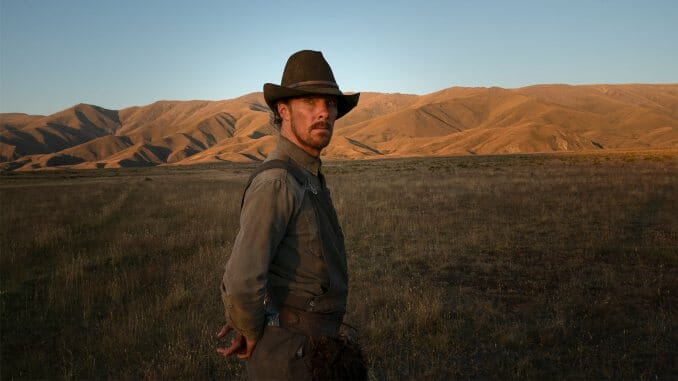The Power of the Dog is a Muted Portrait of Rage and Repression

Jane Campion’s The Power of the Dog opens with a voiceover, one that is never repeated again in the film. As the title card unfurls and the opening credits roll, we listen to Peter (Kodi Smit-McPhee) explain that in the aftermath of his father’s death, he felt it more necessary than ever to be a man for his mother, Rose (Kirsten Dunst)—that he would do anything in his power to protect her. It’s easy to find yourself so wrapped up in the austere unease of Campion’s first feature in over a decade that one might fully overlook the obviousness laden in Peter’s opening words, and uncertainty as to the film’s overt approach to its subject material is recurrent. But in a way, this introductory voiceover ties into a subversion of expectations, of men and masculinity, that is part of the point. Because when Peter is finally introduced in the film, it’s possible that you’ve fully forgotten the sentiment he decided to impart upon us. Perhaps that was his hope all along.
Based on the 1967 novel of the same name by Thomas Savage, Campion’s long-awaited return to the medium of film—following 2009’s Bright Star and her subsequent years spent working in television—feels apt for a director who has demonstrated prowess at crafting an atmosphere of acute disquiet. And so it goes for The Power of the Dog, a film with a perpetual twitching vein, carried by the ubiquitous feeling that someone could snap at any moment—until they do. In 1925 Montana, brothers Phil (Benedict Cumberbatch) and George Burbank (Jesse Plemons) are prosperous cattle ranchers but incompatible siblings. Phil is the ultimate image of machismo, brooding around the ranch ever adorned in his cowboy outfit and a thick layer of grime on his face, a rolled cigarette hanging against his lower lip; a character that acts in defiance of Cumberbatch’s past work. Phil is so opposed to anything even adjacent to what could be considered “feminine” that things like bathing, playing an instrument that isn’t a banjo and just being nice to women are the kinds of activities which might lead Phil to inquire “Fellas, is it gay if…?” on Twitter.
Phil also lives eternally in the shadow of the mythic Bronco Henry: A deceased cowboy and friend of Phil’s who embodied his masculine ideal. Meanwhile, George is a polished, well-to-do sort of man. He deflects his brother’s constant condescension and label of “fatso” with silence, and with the kind of patient stoicism skillfully deployed by Plemons and reminiscent of his slightly more bumbling turn in Fargo. Such a personality schism between the two brothers is an undaunted source of irritation to Phil. This is heightened as George takes a liking to “suicide widow” and owner of the local inn, Rose, and far intensified when, to Phil’s horror, George quickly marries her. Suddenly, George has committed the ultimate, anti-dude sin: Marrying and having sex with a girl. And not only will Rose be moving in with George and Phil at their ranch, but so will her waifish, effeminate son Peter, whose aspirations in the field of medicine are far more at odds with Phil’s ideas of masculinity than George could ever be.
-

-

-

-

-

-

-

-

-

-

-

-

-

-

-

-

-

-

-

-

-

-

-

-

-

-

-

-

-

-

-

-

-

-

-

-

-

-

-

-








































